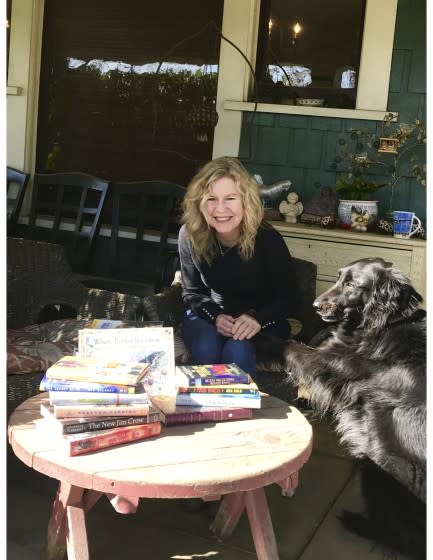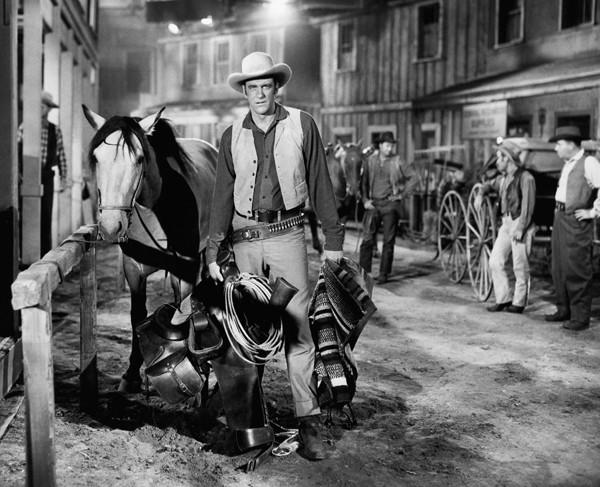What Susan Straight is reading, hearing and watching in quarantine

The Times asked authors to track what they do in isolation. Today, the novelist Susan Straight quarantines on her Riverside porch, gives books away from her picket fence, blasts Jimi Hendrix from her car and compares "Gunsmoke" to "Gentefied."
Monday, March 23
Then I put inside the bag three books my girls had loved. “Play Ball, Amelia Bedelia.” “Toothless Wonder,” a Junie B. Jones book. “It’s Nice to Be a Mountain Lion,” a picture book. And one I wrote for Rosette, when she was in fourth grade: “The Friskative Dog,” about a girl who lives in an apartment and has a stuffed dog she believes is real. This is the second week of no school in Riverside, California. On my long narrow block which ends at the bluff overlooking the Santa Ana River, there are about 35 kids. Many of them are on the sidewalks, riding bikes and scooters, walking their parents, who are nervous.
My three daughters are grown now, quarantined in their homes. Rosette in West Hollywood, reading Ali Wong’s memoir; Delphine, 28, has been homebound for weeks in Berkeley, whence she FaceTimes me, reading Lauren Wilkinson’s “American Spy”; she tells me Gaila — 30, in Austin, Texas — is reading Deborah Miranda’s memoir “Bad Indians.”

I am quarantined on the front porch, because I am a native and cannot be without sun and the oranges I just picked from the tree. I am reading for the second time “American Salvage,” by Bonnie Jo Campbell, so deep of place in northern Michigan that I can see the muddy snow and farmhouses where one character goes to buy a boar. I remember when my father-in-law’s friend raised pigs just across the river, in Rubidoux.
I’ve lived in this old farmhouse for 32 years. Mine is a neighborhood of barter, where we trade oranges and avocados, fresh eggs and just-caught fish, clothes and tools. For these past two weeks, we’ve been trading groceries and tamales, and I give away books. One neighbor walks past daily with two daughters who look exactly as I did at 6 and 9 — blond hair, glasses, wary solemn faces — and their aged bulldog. They are schooling at home, but like many families, they have no computer, no internet. I leave the True Food Kitchen bag on the fence slats, so we maintain distance. I tell the girls I wrote “The Friskative Dog.” “OK,” they shrugged. Being a writer is just another job.
Inside, on a little black boombox Delphine got me this year, I listen to Marci Wiser on KLOS. Marcy talks to callers who are working as EMTs, AC installers, DoorDash drivers, callers who request Jimi Hendrix, Sublime, Led Zeppelin. I’m old school — no Spotify.
I am writing an essay about my mother-in-law, Alberta Sims, who taught me to cook for strangers, and my mother, who learned to speak English by listening to Vin Scully broadcasting the Dodgers. We moved my mother, 85, into assisted living only last month; she is two miles from me, and every day when I call, she laments the loss of her beloved baseball games. She has to eat in her room. She’s going crazy.
On this day, I realize, I was supposed to be in Baltimore at a literature festival for my book, “In the Country of Women.” As the sun sets, I go to Rite Aid and buy the things my mother asked me for today. Bougainvillea flowers drape over every fence, and I turn up the radio on “All Along the Watchtower” and open the window. But then I am home, exhausted. I watch Ken Burns' “Country Music,” thinking of my father, his stories of the Depression, burning the spines off cactus as a child to feed the cattle, watching people starve. It is the Carter Family I crave. I watch “Walk the Line,” to see Reese Witherspoon inhabit June Carter so vividly, to see Johnny Cash’s fundamental sadness over his father. At midnight, I pack more bags of oranges and books.
Tuesday
That book had belonged to my stepfather, 85, who also went into assisted living here in Riverside. Only three weeks ago, my niece and I packed up 50 years’ worth of his books. They remain on the porch as I can’t donate them to the library, which is closed.

My stepdad was born in Maritime Canada, land of snow and fish, and loved maps and atlases. I read intently the pages of his old Thomas Guides, loving their permanent record of Southern California streets. I’ll never give those away. But what will I do with these countless National Geographics? And mystery novels by Ross MacDonald, John D. MacDonald, John Le Carré, books I read as a child, the reason my first short stories all featured dead bodies and vivid landscapes?
I spend the next two days sorting through hundreds of books. I put out 10 National Geographics in a basket hanging from the fence slats, and every night, most of them are gone.
One family with four young kids stops at the fence. The parents live on my street, are homeschooling, and had gotten most of their books from the library. In their bag: “Freckle Juice” by Judy Blume, “Appaloosa Pete and the Band of Wiley Wolves," Sharon Creech’s “Ruby Holler.” And yes, “The Friskative Dog,” because I had eight paperbacks. Why not give them away now?
I write at dusk, on the porch, the dog beside me. I am also writing about my grandmother, Rosa Leu, born in the Swiss Alps, who was for decades nurse-in-charge at the original Kaiser Hospital in Fontana, starting in 1952. For “In the Country of Women,” I found a photo of that small building. I think of the 80,000 Kaiser employees working right now.
Tonight, I read from the most prescient, terrifying novel for now: Carolyn See’s “There Will Never Be Another You,” from 2006. “Epidemics and chemicals and explosives have ravaged certain parts of the globe — the trick, I suppose, is to stay off the beaten track, whatever the track may be,” a character says. Her son, a doctor at UCLA, is recruited to work on a traveling ship of quarantined specialists, working on vaccines for each new pandemic. I’ve just seen an email from Lisa See, talking about how her mother knew the future.
Wednesday
I start a brand-new novel, “Godshot,” by Chelsea Bieker, who was raised in the Central Valley. It’s a great story of drought and a girl whose town is in thrall to a dangerous evangelist, who walks in dry cracked canals and wonders whether dirt burns. And one character wears a Blink-182 T-shirt, which makes me, from the land of 909, happy.

But by nighttime, I am too tired to write. I have talked to my daughters, to my parents, my friends, I have delivered dinners to an elderly neighbor who just broke her foot, delivered food and cookies to housebound people. I have hauled books to the fence and listened. I watch two hours of “Gunsmoke,” because Louie and I remembered that our fathers all watched it. Then an hour of “Gentefied,” the great new series about painful changes in Boyle Heights. I realize the older men on both shows walked exactly the same way. The ranchers and cowboys on “Gunsmoke,” backs stiff from work; the Mexican-born father in “Gentefied” who has spent years making food, his legs bowed and painful. The isolation and sadness on those dirt roads and those L.A. sidewalks send me out back onto my porch, in the dark, to listen to the eerie silence without what I usually hear: the tubas and accordions of ranchera music, the booming bass of Tupac, and laughter from the streets.
Straight’s latest book, "In the Country of Women," is a memoir of five generations of female ancestors, migration and California.

